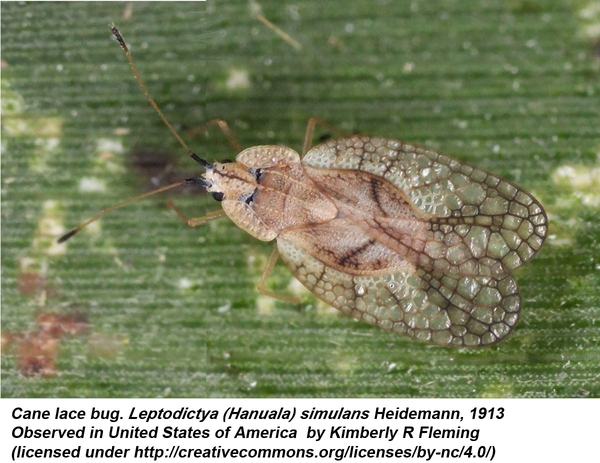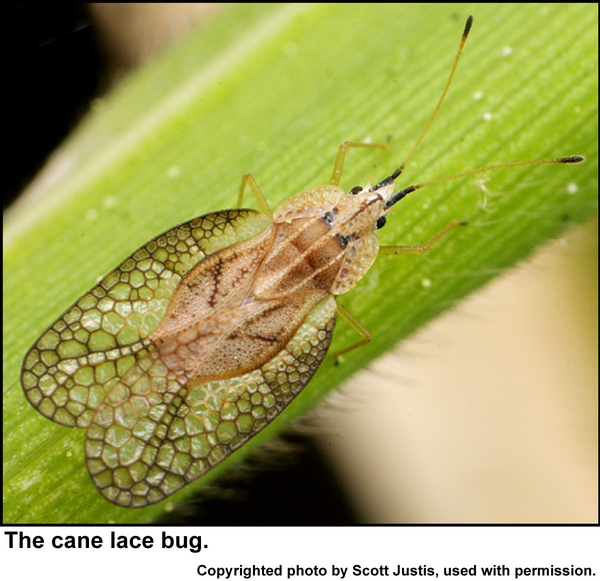Description and Biology
The cane lace bug or bamboo lace bug, Leptodictya simulans, is a small lace bug with the flattened extensions (paranota) of the thorax creased and folded back onto the thorax. Unlike most common lace bugs, the top wing and paranotum do not have noticeable humps. Little has been published on the immature stages and biology of the cane lace bug. If its biology is anything like that of other lace bugs, the cane lace bug inserts its eggs into plant tissue to protect them from the environment and teeny-weeny parasitic wasps. The nymphs probably feed in groups when young. Lace bugs inject saliva as they feed resulting in a pale spot at each feeding site. Nymphs probably develop through five stages as they grow. We probably have four or five generations per year in North Carolina, and these lace bugs probably overwinter as eggs inside cane leaves.
Host Plants
In North Carolina, the cane lace bug has been collected from cane, Arundinaria spp., and from black bamboo (Phyllostachys nigra), an ornamental that can readily escape to become an invasive weed.
Rsidential Recommendations
The cane lace bug is undoubtedly susceptible to Orthene insecticide and other insecticides useful for lace bug suppression in the landscape.
Other Resources
- Lace Bugs, Frank, S. D. and S. Bambara. 2009 (revised). Entomology Insect Notes. NC State Extension Publications.
- Species Leptodictya simulans. Belov, V., Bbarnd, and Mike Quinn. 2017 (update). BugGuide, Iowa State University, Dept. Plant Path. and Entomol. and Microbiology. https://bugguide.net/node/view/267688
- The Lace Bugs (Hemiptera: Tingidae) of North Carolina and Their Hosts. Horn, K. F., C. G. Wright, and M. H. Farrier. 1979. NC Agr. Exp. Sta. Tech. Bul. 257. 22 pp.
- NC State Extension Plant Pathology Publications
- NC State Horticultural Science Publications
- North Carolina Agricultural Chemicals Manual
For assistance with a specific problem, contact your local Cooperative Extension center.
This factsheet has not been peer reviewed.
Publication date: Sept. 12, 2020
Reviewed/Revised: Aug. 20, 2025
Recommendations for the use of agricultural chemicals are included in this publication as a convenience to the reader. The use of brand names and any mention or listing of commercial products or services in this publication does not imply endorsement by NC State University or N.C. A&T State University nor discrimination against similar products or services not mentioned. Individuals who use agricultural chemicals are responsible for ensuring that the intended use complies with current regulations and conforms to the product label. Be sure to obtain current information about usage regulations and examine a current product label before applying any chemical. For assistance, contact your local N.C. Cooperative Extension county center.
N.C. Cooperative Extension prohibits discrimination and harassment regardless of age, color, disability, family and marital status, gender identity, national origin, political beliefs, race, religion, sex (including pregnancy), sexual orientation and veteran status.


